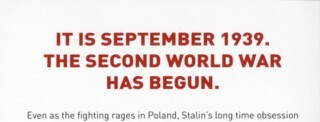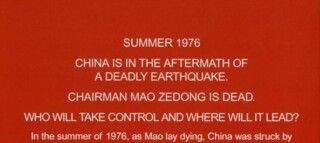4 November 2011
The Trade
Daniel Soar
Two new book proofs have arrived in the office:
And:
Both are to be published by Faber early next year. One is a history book, the other a novel. Guess which is which.
Two new book proofs have arrived in the office:

And:

Both are to be published by Faber early next year. One is a history book, the other a novel. Guess which is which.
This site requires the use of Javascript to provide the best possible experience. Please change your browser settings to allow Javascript content to run.
Comments
-
5 November 2011
at
2:29am
outofdate
says:
I tend to score very low on these test-your-reasoning quizzes, either because I'm thick as two short planks or because I try to second-guess them (which may just be another way of saying I'm thick as two short planks). So, you'd think the Stalin one's a bad thriller and the China one history, so it's the other way round.
-
5 November 2011
at
9:30am
philip proust
says:
Is there a prize?
-
6 November 2011
at
10:38pm
Bob Beck
says:
The China one is more prolix and clumsily-written, so I'll guess it's the history.
-
7 November 2011
at
12:43pm
alex
says:
I've done this with students using openings to novels & non-fictional reportage. Plenty of speculation but in the end there was nothing conclusive anyone could point to.
-
7 November 2011
at
5:53pm
Samuel Lisi
says:
Google answers the question quickly...
-
7 November 2011
at
9:52pm
alex
says:
Who needs Google? We of the generation who flipped channels to avoid hearing the scores in advance of Match of the Day are made of sterner stuff.
-
7 November 2011
at
10:34pm
Bob Beck
says:
@
alex
And flipped channels by turning an actual dial on the television set, no less. Remote controls, even if available, were for rich kids and effete snobs.
-
8 November 2011
at
12:01am
outofdate
says:
@
Bob Beck
You were lucky. We had to carry the TV over to the new channel, across two mile of burning slag, etc.
-
8 November 2011
at
12:42am
Harry Stopes
says:
@
outofdate
And if you told the young people today, they wouldn't believe you.... I certainly don't.
-
8 November 2011
at
2:50am
Bob Beck
says:
@
Harry Stopes
No reason they, or you, should. Even though we couldn't afford telly. We had to take it in turns to stick our heads through a hole in a cardboard box, and act out programs. When we could scrounge a box, that is.
-
8 November 2011
at
9:16am
alex
says:
@
Bob Beck
you could scrounge a box? We had to take the wire from old coathangers and bras and bend it into a cuboid shape and imagine the sides of the box and then unbend it and put it back in time for tea. It were terrible work. Still, if it meant we saved time over Googling in later life I'm grateful.
-
8 November 2011
at
2:23pm
Bob Beck
says:
@
alex
... you had tea?
-
8 November 2011
at
5:18pm
alex
says:
@
Bob Beck
Tea is a time not a commodity. You know the cockney joke:
-
8 November 2011
at
8:09pm
Bob Beck
says:
@
alex
Oh aye; but y'see, we had neither t' time, nor t' commodity. Alienated labour, wi'out even t' illusory compensation of commodity fetishism. True deprivation, and no mistake.
-
8 November 2011
at
8:28pm
Harry Stopes
says:
@
Bob Beck
Forgive me for taking this conversation seriously for a second, but I think that "the" in Yorkshire/Lancashire speech isn't quite like that. Writing "neither t' time" implies that the contraction only takes place at the end of the word 'the'. I think it'd be more accurate to say that as well as hardening the /ð/ sound into something more like a /t/, my fellow countrymen also cut out the gap between the end of previous word and the 'the.' It's better illustrated with a sentence involving "to the" (which is more representative of this sort of thing anyway). Instead of "Are you coming to the pub?" you could write "are you coming tut pub?"
-
9 November 2011
at
8:15am
alex
says:
@
Bob Beck
I had trouble with the transcription. I put in two apostrophes one for each 't', ends up looking like a double quote mark. But as the joke suggests, there's no t there.
-
8 November 2011
at
2:56am
Saffy
says:
Luxury.
-
8 November 2011
at
2:59am
Saffy
says:
@
Saffy
' Course, I was replying to you, Bob Beck..
-
8 November 2011
at
3:12pm
Bob Beck
says:
@
Saffy
'Course -- bah goom.
-
8 November 2011
at
9:32pm
Bob Beck
says:
@
Bob Beck
... and, since the software won't let me reply to Harry Stopes directly (too much nesting or something), I'll reply here -- at least to say, I'll happily defer to you on this. Unfortunately I've never been to Lancashire or Yorkshire, and (since alex mentioned Cockneys) only once even been within sound of Bow Bells.
-
8 November 2011
at
10:19pm
Harry Stopes
says:
@
Bob Beck
Yes, that sounds about right. Actually though, to be precise I'm from Manchester. http://www.youtube.com/watch?v=6kLhZTP4ywY&feature=related
-
8 November 2011
at
11:18pm
Bob Beck
says:
@
Harry Stopes
Of course! Clarke (Cooper Clarke?) is brilliant. I assume that you've seen this as well?
-
8 November 2011
at
11:49pm
Harry Stopes
says:
@
Bob Beck
No I hadn't seen that, thanks. Is the audio track a real Joy Division TV performance? The bit with the presenter sounds like the guy who played Tony Wilson in Control, rather than the real deal.
-
8 November 2011
at
11:58pm
Bob Beck
says:
@
Harry Stopes
It is a real performance, evidently; and the Playmobil video is almost a shot-for-shot recreation of the original:
-
9 November 2011
at
12:12am
Bob Beck
says:
@
Bob Beck
A little searching persuades me you're right, and they've spliced the "Control" introduction onto the beginning of the original "Wedge" performance.
-
8 November 2011
at
3:13am
outofdate
says:
Just for the novels Faber has three in a row. First up is our Inspector Pekkala here, then: 'It's summer, 1936 [it's commas, all the, way]. The writer, Josephine Tey, joins her friends in the holiday village of Portmeirion to celebrate her fortieth birthday. Alfred Hitchcock and his wife, Alma Reville...' and then the clincher: 'Baghdad 1917. Captain Jim Stringer, invalided from the Western Front, has been dispatched to investigate what looks like a nasty case of treason. He arrives to find a city on the point of insurrection, his cover apparently blown - and his only contact lying dead with flies in his eyes.'
-
8 November 2011
at
12:48pm
Daniel Soar
says:
Nice work, people, and I like Bob's reasoning. What I thought might give it away is the tense in the non-caps text -- 'as the fighting rages in Poland' v. 'as Mao lay dying'. But that's about it.
-
8 November 2011
at
8:17pm
Bob Beck
says:
@
Daniel Soar
Shucks, 'tweren't nuthin' -- though it was a guess I wasn't all that confident in.
Read moreHere I'd agree with Bob, for related but not identical reasons: "Poland 1939" is lettered/designed more professionally. But that in itself isn't conclusive.
Daniel Soar's piece from a few weeks ago comes to mind.
- 'Ow full is a li're bo''le of Earl Grey?
- Empty - it's got no t in it.
I didn't know that joke, but from your transcription, Cockneys pronounce "bottle" much as outport Newfoundlanders do. Instead of a "t," a glottal (glo''al?) stop.
For what it's worth, Alan Bennett writes somewhere that the shortened "the" or "to the" can resemble a short pause, or syncopation, rather than a positive sound. Does that accord with your experience?
http://www.youtube.com/watch?v=_UQmY57qrfw
The comments are quite moving somehow: "I was healed for the first time in the tune of Joy Division. I'm sorry for my poor English." for example.
http://www.youtube.com/watch?v=ihCbVT637aM&feature=grec_index
I haven't found a YouTube version with the presenter's comments, but this clip begins with a bit of "Evidently Chickentown."
But then, between history studies and my current employment, I'm quite familiar, alas, with clunky writing. (My dentist says I grind my teeth. I'm not aware of it, but not surprised either). Of course, plenty of thriller writers crank out slaphead material. Take Dan Brown -- please. But that's why marketing departments were invented.